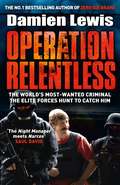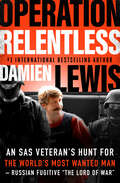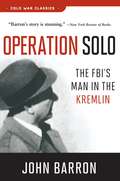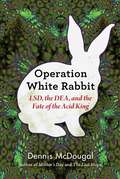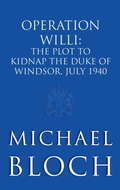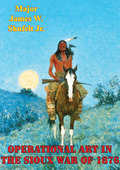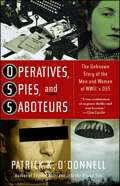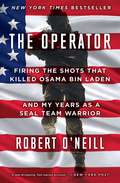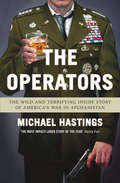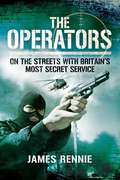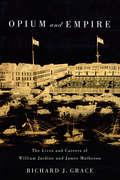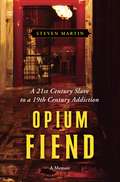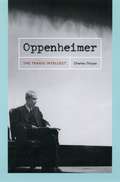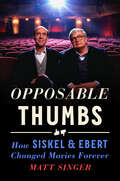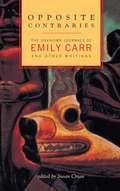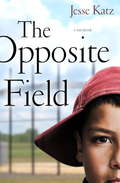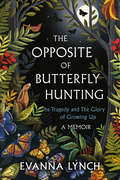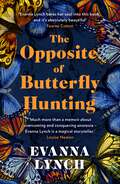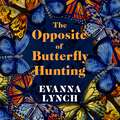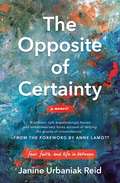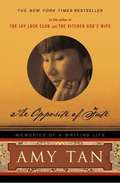- Table View
- List View
Operation Relentless: The Hunt for the Richest, Deadliest Criminal in History
by Damien Lewis'The Night Manager meets Narcos' Saul David'To catch this criminal took incredible courage and skill. This is James Bond meets Jason Bourne' Bear GryllsThe new bestseller from the author of Zero Six BravoBy 2007 Viktor Bout had become the world's foremost arms dealer. Known as the 'Merchant of Death' he was both "Public Enemy No. 1" to the global intelligence agencies and a ruthless criminal worth around six billion dollars.For years Bout had eluded capture, meanwhile building up a labyrinthine network of airlines selling weapons to order to dictators, rebels, despots and terror groups worldwide. He was hunted by the CIA, NSA, MI6, as well sought by the United Nations for being their top global sanctions buster. Holed up in Moscow - from where he ran a suite of offices selling anything from AK47s to state-of-the-art helicopter gunships and anti-aircraft missiles - he was shielded by a Russian state that was a partner in his dark dealings. In short, Bout appeared utterly invulnerable and beyond any hope of capture. Step forward former SAS man Mike Snow. After serving in the Regiment, Snow had worked as a bush pilot in Africa, where he'd got to know Bout well. Via its own secretive, shadow network, Snow was approached by the US DEA, the Drugs Enforcement Agency. The DEA agents had one question for him: was Snow able to get to Viktor Bout? This is the incredible tale of OPERATION RELENTLESS, the top-secret mission that Snow and a handful of DEA operatives launched to entrap Viktor Bout - a story that ranges from the steamy jungles of Colombia to the ice-bound streets of Moscow, and from horrific bloodshed and tyranny in the Congo, to a snatch operation like no other. It may read like an implausible thriller, but every word of Operation Relentless is true.
Operation Relentless: The Hunt for the Richest, Deadliest Criminal in History
by Damien LewisFor years Bout had eluded capture, meanwhile building up a labyrinthine network of airlines selling weapons to order to dictators, rebels, despots and terror groups worldwide. He was hunted by the CIA, NSA, MI6, as well sought by the United Nations for being their top global sanctions buster. Holed up in Moscow - from where he ran a suite of offices selling anything from AK47s to state-of-the-art helicopter gunships and anti-aircraft missiles - he was shielded by a Russian state that was a partner in his dark dealings. In short, Bout appeared utterly invulnerable and beyond any hope of capture. Step forward former SAS man Mike Snow. After serving in the Regiment, Snow had worked as a bush pilot in Africa, where he'd got to know Bout well. Via its own secretive, shadow network, Snow was approached by the US DEA, the Drugs Enforcement Agency. The DEA agents had one question for him: was Snow able to get to Viktor Bout? This is the incredible tale of OPERATION RELENTLESS, the top-secret mission that Snow and a handful of DEA operatives launched to entrap Viktor Bout - a story that ranges from the steamy jungles of Colombia to the ice-bound streets of Moscow, and from horrific bloodshed and tyranny in the Congo, to a snatch operation like no other. It may read like an implausible thriller, but every word of Operation Relentless is true.
Operation Relentless: An SAS Veteran's Hunt for the World's Most Wanted Man—Russian Fugitive "The Lord of War"
by Damien LewisThe true story of the top-secret mission to capture the Russian billionaire arms dealer, the Merchant of Death: &“This is James Bond meets Jason Bourne&” (Bear Grylls, star of Man vs. Wild). Viktor Bout was the world&’s foremost arms dealer. From his hideout in Moscow, he masterminded the sale of weapons to dictators, rebels, despots, and terror groups worldwide—supplying anything from AK-47s to state-of-the-art helicopter gunships and anti-aircraft missiles. Known as the Merchant of Death, he was hunted by MI6, INTERPOL, the CIA, the NSA, and more. But the former KGB officer was shielded by a Russian state that partnered in his dark dealings. Evading capture for years, Bout appeared utterly invulnerable. Then elite forces veteran Mike Snow, AKA The Bear, stepped forward. Snow had gotten to know Bout while working as a bush pilot in war-torn Africa. When the Drug Enforcement Agency approached Snow through a secretive, shadow network, they had one question for him: could he ensnare the Merchant of Death? This is the real-life tale of Operation Relentless, the classified mission masterminded by Snow and a team of DEA operatives. Based on first-hand testimonies, it is the thrilling tale of a manhunt that ranges from the jungles of Colombia to the streets of Moscow, from horrific bloodshed and tyranny in Afghanistan to a snatch operation like no other.
Operation Solo: The FBI's Man in the Kremlin (Cold War Classics)
by John BarronOperation Solo is America's greatest spy story. For 27 years, Morris Childs, code name "Agent 58", provided the United States with the Kremlin's innermost secrets.Repeatedly risking his life, "Agent 58" made 57 clandestine missions into the Soviet Union, China, Eastern Europe, and Cuba. Because of his high ranking in the American communist party and his position as editor of its official paper, the Daily Worker, he was treated like royalty by communist leaders such as Khrushchev, Brezhnev, and Mao Tse-tung. Through first-hand accounts, Operation Solo tells the story of the conflicts within the FBI and American intelligence about the operation, and how the FBI, through extraordinary measures, managed to keep that operation hidden from everyone, including the CIA.
Operation White Rabbit: LSD, the DEA, and the Fate of the Acid King
by Dennis McDougalA search for the truth behind the DEA&’s life imprisonment of acid's most famous martyr. Operation White Rabbit traces the rise and fall—and rise and fall again—of the psychedelic community through the life of the man known as the &“Acid King:&” William Leonard Pickard. Pickard was a legitimate genius, a follower of Timothy Leary, a con artist, a womanizer, and a believer that LSD would save lives. He was a foreign diplomat, a Harvard fellow, and the biggest producer of LSD on the planet—if you believe the DEA. A narrative for fans of Michael Pollan&’s How to Change Your Mind, Pickard&’s personal story is set against a fascinating chronicle of the social history of psychedelic drugs from the 1950s on. From LSD distribution at UC Berkeley to travelling the world for the State Department, Pickard&’s story is one of remarkable genius—that is, until a DEA sting named &“Operation White Rabbit&” captured him at an abandoned missile silo in Kansas. Pickard, the DEA said, was responsible for 90 percent of the world&’s production of lysergic acid. The DEA announced to the public that they found 91 pounds of LSD. In reality, the haul was seven ounces. They found none of the millions of dollars Pickard supposedly amassed, either. But nonetheless, he is now serving two consecutive life sentences without possibility of parole. Pickard has become acid&’s best-known martyr in the process, continuing his advocacy and artistic pursuits from jail. Pickard has successfully sued the US government because his requests for information on his case returned two blank DEA documents. But the appeals of his sentence have continually failed. The author visits him regularly in jail in an effort to find the truth.
Operation Willi: The Plot to Kidnap the Duke of Windsor, July 1940
by Michael BlochIn this fascinating piece of historical detective work ? the result of several years? research and the interrogation of numerous surviving witnesses ? Michael Bloch has penetrated one of the great mysteries of the Second World War: the plot to bring the Duke of Windsor under German power on the eve of the Battle of Britain, a plot which the Duke himself is sometimes said to have given encouragement. A work of historical sleuthing in the classic tradition, combining powerful writing with scrupulous scholarship.
Operation Willi: The Plot to Kidnap the Duke of Windsor, July 1940
by Michael BlochIn this fascinating piece of historical detective work - the result of several years' research and the interrogation of numerous surviving witnesses - Michael Bloch has penetrated one of the great mysteries of the Second World War: the plot to bring the Duke of Windsor under German power on the eve of the Battle of Britain, a plot which the Duke himself is sometimes said to have given encouragement. A work of historical sleuthing in the classic tradition, combining powerful writing with scrupulous scholarship.
Operational Art In The Sioux War Of 1876
by Major James W. Shufelt Jr.This monograph discusses the role of operational art in the Sioux War of 1876, the U.S. Army's largest campaign between the Civil War and the Spanish-American War. This campaign, often overlooked in the historical study of operational art, demonstrates the successful application of operational art in a non-traditional campaign: the U.S. Army's defeat of the Northern Sioux Indians and their allies. This campaign also demonstrates how operational art can lead to operational victory, despite repeated tactical failures.The monograph first defines operational art, based on emerging U.S. Army doctrine, and then reviews its role in three campaigns that served as models for the Army's operations in the Sioux War of 1876: Grant's 1864-1865 campaign to defeat the Confederacy, the Southern Plains War of 1868-1869, and the Red River War of 1874-1875. The plans and execution of the Sioux War of 1876 are then reviewed and analyzed utilizing the definition of operational art and modem concepts for operational planning. The causes of failure in the 1876 campaign are then analyzed, based on Cohen and Gooch's methodology for analysis of military failure, followed by explanation of the campaign's ultimate success.The monograph concludes that the Frontier Army's success in this campaign demonstrates successful application of operational art, despite many errors in planning and execution committed by General Sheridan and his subordinates. Additional lessons from this campaign include the danger of blindly applying previously successful models for operations, the preeminent role of the operational commander, and the validity of operational art in campaigns against unconventional foes.
Operatives, Spies, and Saboteurs: The Unknown Story of the Men and Women of World War II's OSS
by Patrick K. O'DonnellThe battles of World War II were won not only by the soldiers on the front lines, and not only by the generals and admirals, but also by the shadow warriors whose work is captured for the first time in Operatives, Spies, and Saboteurs. Thanks to the interviews and narrative skills of Patrick O'Donnell and to recent declassifications, an entire chapter of history can now be revealed. A hidden war -- a war of espionage, intrigue, and sabotage -- played out across the occupied territories of Europe, deep inside enemy lines. Supply lines were disrupted; crucial intelligence was obtained and relayed back to the Allies; resistance movements were organized. Sometimes, impromptu combat erupted; more often, the killing was silent and targeted. The full story of the Office of Strategic Services -- OSS, precursor to the CIA -- is a dramatic final chapter on one of history's most important conflicts. In a world made unrecognizable by the restrictions placed on the CIA today, OSS played fast and loose. Legendary chief "Wild Bill" Donovan created a formidable organization in short order, recruiting not only the best and brightest, but also the most fearless. His agents, both men and women, relied on guile, sex appeal, brains, and sheer guts to operate behind the lines, often in disguise, always in secret. Patrick O'Donnell, called "the next Studs Terkel" by bestselling author Hampton Sides, has made it his life's mission to capture untold stories of World War II before the last of its veterans passes away. He has succeeded in extracting stories from the toughest of men, the most elite of soldiers, and, now, the most secretive of all: the men and women of OSS. From former CIA director William Colby, who parachuted into Norway to sever rail lines, to Virginia Hall, who disguised herself as a milkmaid, joined the French Resistance, and became one of Germany's most wanted figures, the stories of OSS are worthy of great fiction. Yet the stories in this book are all true, carefully verified by O'Donnell's painstaking research. The agents of OSS did not earn public acclaim. There were no highly publicized medal ceremonies. But the full story of OSS reveals crucial work in espionage and sabotage, work that paved the way for the Allied invasions and disrupted the Axis defenses. Operatives, Spies, and Saboteurs proves that the hidden war was among the most dramatic and important elements of World War II.
The Operator: Firing the Shots that Killed Osama bin Laden and My Years as a SEAL Team Warrior
by Robert O'Neill<P>A stirringly evocative, thought-provoking, and often jaw-dropping account, The Operator ranges across SEAL Team Operator Robert O’Neill’s awe-inspiring four-hundred-mission career, which included his involvement in attempts to rescue “Lone Survivor” Marcus Luttrell and abducted-by-Somali-pirates Captain Richard Phillips and which culminated in those famous three shots that dispatched the world’s most wanted terrorist, Osama bin Laden. <P>In these pages, O’Neill describes his idyllic childhood in Butte, Montana; his impulsive decision to join the SEALs; the arduous evaluation and training process; and the even tougher gauntlet he had to run to join the SEALs’ most elite unit. After officially becoming a SEAL, O’Neill would spend more than a decade in the most intense counterterror effort in US history. For extended periods, not a night passed without him and his small team recording multiple enemy kills—and though he was lucky enough to survive, several of the SEALs he’d trained with and fought beside never made it home. <P>The Operator describes the nonstop action of O’Neill’s deployments in Iraq and Afghanistan, evokes the black humor of years-long combat, brings to vivid life the lethal efficiency of the military’s most selective units, and reveals firsthand details of the most celebrated terrorist takedown in history. <P><b>A New York Times Bestseller</b>
The Operators: The Wild and Terrifying Inside Story of America's War in Afghanistan
by Michael HastingsThe inspiration for the upcoming movie WAR MACHINE, starring Brad Pitt, Tilda Swinton and Ben Kingsley (streaming on Netflix from 26 May).General Stanley McChrystal, the innovative commander of international and US forces in Afghanistan, was living large. Loyal staff liked to call him a 'rock star'. During a spring 2010 trip across Europe to garner additional Allied help for the war effort, McChrystal was accompanied by journalist Michael Hastings of ROLLING STONE. For days, Hastings looked on as McChrystal and his staff let off steam, partying and openly bashing the Obama administration for what they saw as a lack of leadership. When Hastings' piece appeared a few months later, it set off a political firestorm: McChrystal was ordered to Washington, where he was unceremoniously fired.In THE OPERATORS, Hastings gives us a shocking behind-the-scenes portrait of Allied military commanders, their high-stakes manoeuvres and often bitter bureaucratic in-fighting. He takes us on patrol missions in the Afghan hinterlands and to hotel bars where spies and expensive hookers participate in nation-building gone awry, drawing back the curtain on a hellish complexity and, he fears, an unwinnable war.
The Operators: On The Street with Britain's Most Secret Service (Pen And Sword Military Classics Ser.)
by James RennieFew outside the security services have heard of 14 Company. As deadly as the SAS yet more secret, the Operators of 14 Company are Britains most effective weapon against international terrorism. For every bomb that goes off 14 Company prevent twelve. The selection process is the most physically, intellectually and emotionally demanding anywhere in the world. Trained to operate under cover, Operators have at their disposal an arsenal of techniques and weapons unmatched by any other UK government or military agency. This is the true story of one Operator and of some of the most hair-raising military operations ever conducted on the streets of Britain.
Opium and Empire
by Richard J. GraceIn 1832 William Jardine and James Matheson established what would become the greatest British trading company in East Asia in the nineteenth century. After the termination of the East India Company's monopoly in the tea trade, Jardine, Matheson & Company's aggressive marketing strategies concentrated on the export of teas and the import of opium, sold offshore to Chinese smugglers. Jardine and Matheson, recognized as giants on the scene at Macao, Canton, and Hong Kong, have often been depicted as one-dimensional villains whose opium commerce was ruthless and whose imperial drive was insatiable. In Opium and Empire, Richard Grace explores the depths of each man, their complicated and sometimes inconsistent internal workings, and their achievements and failures. He details their decades-long journeys between Britain and China, their business strategies and standards of conduct, and their inventiveness as "gentlemanly capitalists." The commodities they marketed also included cotton, rice, textile goods, and silks and they functioned as agents for clients in India, Britain, Singapore, and Australia. During the First Opium War Jardine was in London giving advice to Lord Palmerston, while Matheson was detained under house arrest at Canton in the spring of 1839, an incident which helped prompt the armed British response. Moving beyond the caricatures of earlier accounts, Opium and Empire tells the story of two Scotsmen whose lives reveal a great deal about the type of tough-minded men who expanded the global markets of Victorian Britain and played major roles in changing the course of modern history in East Asia.
Opium and Empire: The Lives and Careers of William Jardine and James Matheson
by Richard J. GraceIn 1832 William Jardine and James Matheson established what would become the greatest British trading company in East Asia in the nineteenth century. After the termination of the East India Company's monopoly in the tea trade, Jardine, Matheson & Company's aggressive marketing strategies concentrated on the export of teas and the import of opium, sold offshore to Chinese smugglers. Jardine and Matheson, recognized as giants on the scene at Macao, Canton, and Hong Kong, have often been depicted as one-dimensional villains whose opium commerce was ruthless and whose imperial drive was insatiable. In Opium and Empire, Richard Grace explores the depths of each man, their complicated and sometimes inconsistent internal workings, and their achievements and failures. He details their decades-long journeys between Britain and China, their business strategies and standards of conduct, and their inventiveness as "gentlemanly capitalists." The commodities they marketed also included cotton, rice, textile goods, and silks and they functioned as agents for clients in India, Britain, Singapore, and Australia. During the First Opium War Jardine was in London giving advice to Lord Palmerston, while Matheson was detained under house arrest at Canton in the spring of 1839, an incident which helped prompt the armed British response. Moving beyond the caricatures of earlier accounts, Opium and Empire tells the story of two Scotsmen whose lives reveal a great deal about the type of tough-minded men who expanded the global markets of Victorian Britain and played major roles in changing the course of modern history in East Asia.
Opium Fiend: A 21st Century Slave to a 19th Century Addiction
by Steven MartinA renowned authority on the secret world of opium recounts his descent into ruinous obsession with one of the world's oldest and most seductive drugs, in this harrowing memoir of addiction and recovery. A natural-born collector with a nose for exotic adventure, San Diego-born Steven Martin followed his bliss to Southeast Asia, where he found work as a freelance journalist. While researching an article about the vanishing culture of opium smoking, he was inspired to begin collecting rare nineteenth-century opium-smoking equipment. Over time, he amassed a valuable assortment of exquisite pipes, antique lamps, and other opium-related accessories--and began putting it all to use by smoking an extremely potent form of the drug called chandu. But what started out as recreational use grew into a thirty-pipe-a-day habit that consumed Martin's every waking hour, left him incapable of work, and exacted a frightful physical and financial toll. In passages that will send a chill up the spine of anyone who has ever lived in the shadow of substance abuse, Martin chronicles his efforts to control and then conquer his addiction--from quitting cold turkey to taking "the cure" at a Buddhist monastery in the Thai countryside. At once a powerful personal story and a fascinating historical survey, Opium Fiend brims with anecdotes and lore surrounding the drug that some have called the methamphetamine of the nineteenth-century. It recalls the heyday of opium smoking in the United States and Europe and takes us inside the befogged opium dens of China, Thailand, Vietnam, and Laos. The drug's beguiling effects are described in vivid detail--as are the excruciating pains of withdrawal--and there are intoxicating tales of pipes shared with an eclectic collection of opium aficionados, from Dutch dilettantes to hard-core addicts to world-weary foreign correspondents. A compelling tale of one man's transformation from respected scholar to hapless drug slave, Opium Fiend puts us under opium's spell alongside its protagonist, allowing contemporary readers to experience anew the insidious allure of a diabolical vice that the world has all but forgotten.
Oppenheimer: The Tragic Intellect (Interspecific Interactions Ser.)
by Charles ThorpeAt a time when the Manhattan Project was synonymous with large-scale science, physicist J. Robert Oppenheimer (1904–67) represented the new sociocultural power of the American intellectual. Catapulted to fame as director of the Los Alamos atomic weapons laboratory, Oppenheimer occupied a key position in the compact between science and the state that developed out of World War II. By tracing the making—and unmaking—of Oppenheimer’s wartime and postwar scientific identity, Charles Thorpe illustrates the struggles over the role of the scientist in relation to nuclear weapons, the state, and culture. A stylish intellectual biography, Oppenheimer maps out changes in the roles of scientists and intellectuals in twentieth-century America, ultimately revealing transformations in Oppenheimer’s persona that coincided with changing attitudes toward science in society. “This is an outstandingly well-researched book, a pleasure to read and distinguished by the high quality of its observations and judgments. It will be of special interest to scholars of modern history, but non-specialist readers will enjoy the clarity that Thorpe brings to common misunderstandings about his subject.”—Graham Farmelo, Times Higher Education Supplement “A fascinating new perspective. . . . Thorpe’s book provides the best perspective yet for understanding Oppenheimer’s Los Alamos years, which were critical, after all, not only to his life but, for better or worse, the history of mankind.”—Catherine Westfall, Nature
Opposable Thumbs: How Siskel & Ebert Changed Movies Forever
by Matt SingerOnce upon a time, if you wanted to know if a movie was worth seeing, you didn&’t check out Rotten Tomatoes or IMDB.You asked whether Siskel & Ebert had given it &“two thumbs up.&”On a cold Saturday afternoon in 1975, two men (who had known each other for eight years before they&’d ever exchanged a word) met for lunch in a Chicago pub. Gene Siskel was the film critic for the Chicago Tribune. Roger Ebert had recently won the Pulitzer Prize—the first ever awarded to a film critic—for his work at the Chicago Sun-Times. To say they despised each other was an understatement.When they reluctantly agreed to collaborate on a new movie review show with PBS, there was at least as much sparring off-camera as on. No decision—from which films to cover to who would read the lead review to how to pronounce foreign titles—was made without conflict, but their often-antagonistic partnership (which later transformed into genuine friendship) made for great television. In the years that followed, their signature &“Two thumbs up!&” would become the most trusted critical brand in Hollywood.In Opposable Thumbs, award-winning editor and film critic Matt Singer eavesdrops on their iconic balcony set, detailing their rise from making a few hundred dollars a week on local Chicago PBS to securing multimillion-dollar contracts for a syndicated series (a move that convinced a young local host named Oprah Winfrey to do the same). Their partnership was cut short when Gene Siskel passed away in February of 1999 after a battle with brain cancer that he&’d kept secret from everyone outside his immediate family—including Roger Ebert, who never got to say goodbye to his longtime partner. But their influence on in the way we talk about (and think about) movies continues to this day.
Opposite Contraries
by Emily Carr Susan CreanCollected from Emily Carr's private and public writings, these previously unpublished pieces reveal the outspoken artist at her most forthright. Expurgated sections from Carr's journals detail her anguished meditations on her spiritual mission, musings about Native culture and the white community's reaction to it, and thoughts about her family. Her groundbreaking 1913 "Lecture on Totems", her first recorded writing on Native art and people, is also included, as are some of her most fascinating letters to friends and colleagues.
The Opposite Field: A Memoir
by Jesse KatzHere is one of the most remarkable, ambitious, and utterly original memoirs of this generation, a story of the losing and finding of self, of sex and love and fatherhood and the joy of language, of death and failure and heartbreak, of Los Angeles and Portland and Nicaragua and Mexico, and the shifting sands of place and meaning that can make up a culture, or a community, or a home. Faced with the collapse of his son’s Little League program–consisting mostly of Latino kids in the largely Asian suburb of Monterey Park, California–Jesse Katz finds himself thrust into the role of baseball commissioner for La Loma Park. Under its lights the yearnings and conflicts of a complex immigrant community are played out amid surprising moments of grace. Each day–and night–becomes a test of Jesse’s judgment and adaptability, and of his capacity to make this peculiar pocket of L. A. ’s Eastside his home. While Jesse soothes egos, brokers disputes, chases down delinquent coaches and missing equipment, and applies popsicles to bruises, he forms unlikely alliances, commits unanticipated errors, and receives the gift of unexpected wisdom. But there’s no less drama in Jesse’s complicated personal life as he grapples with a stepson who seems destined for trouble, comforts his mother (a legendary Oregon politician) when she’s stricken with cancer, and receives hard lessons in finding–and holding on to–the love of a good woman. Through it all, Jesse’s emotional mainstay is his beloved son, Max, who quietly bests his father’s brightest hopes. Over nine springs and summers with Max at La Loma, Jesse learns nothing less than what it takes to be a father, a son, a husband, a coach, and, ultimately, a man. This is an epic book, a funny book, a sexy book, a rapturously evocative and achingly poignant book. Above all it is true, in that it happened, but also in a way that transcends mere facts and cuts to the quick of what it means to be alive.
The Opposite of Butterfly Hunting: The Tragedy and The Glory of Growing Up; A Memoir
by Evanna LynchFrom actress and activist Evanna Lynch comes a raw and compelling memoir about navigating the path between fears and dreams.Evanna Lynch&’s casting as Luna Lovegood in the Harry Potter films is a tale that grew to almost mythic proportions—a legend of how she faced disordered eating as a young girl, found solace in a beloved book series, and later landed the part of her favorite character. But that is not the whole story.Even after recovery, there remains a conflict at her core: a bitter struggle between the pursuit of perfection and the desire to fearlessly embrace her creative side. Revealing a startlingly accomplished voice, Lynch delves into the heart of her relationship with her body. As she takes the reader through a personal journey of leaving behind the safety of girlhood, Lynch explores the pivotal choices that ultimately led her down the path of creativity and toward acceptance of the wild, sensual, and unpredictable reality of womanhood.Honest, electrifying, and inspiring, this is a story of the battle between self-destruction and creation, of giving up the preoccupation with perfection in favor of our uncharted dreams—and how the simple choice to create is the most liberating action a person can take.
The Opposite of Butterfly Hunting: The Tragedy and The Glory of Growing Up: A Memoir
by Evanna Lynch'Gradually, I began to feel this dawning awareness that womanhood was coming for me, that it was looming inevitably, and it didn't feel safe...' Evanna Lynch has long been viewed as a role model for people recovering from anorexia and the story of her casting as Luna Lovegood in the Harry Potter films has reached almost mythic proportions. Here, in her fascinating new memoir, Evanna confronts all the complexities and contradictions within herself and reveals how she overcame a life-threatening eating disorder, began to conquer her self-hate and confronted her fear of leaving the neatness and safety of girlhood for the unpredictable journey of being a woman, all in the glare of the spotlight of international fame.Delving into the very heart of a woman's relationship with her own body, Evanna explores the pivotal moments and choices in her life that led her down the path of creativity and dreaming and away from the empty pursuit of perfection, and reaches towards acceptance of the wild, sensual and unpredictable reality of womanhood. This is a story of the tragedy and the glory of growing up, of mourning girlhood and stepping into the unknown, and how that act of courage is the most magical and creatively liberating thing a woman can do.
The Opposite of Butterfly Hunting: The Tragedy and The Glory of Growing Up: A Memoir
by Evanna Lynch'As well as charting her adolescent battle with anorexia, it offers a darkly compelling, highly topical account of journeying from girlhood to womanhood in the spotlight of global celebrity.' The Mail on Sunday'A raw and powerful memoir, it shares lessons banishing self-hatred.' The Sunday Telegraph'Gradually, I began to feel this dawning awareness that womanhood was coming for me, that it was looming inevitably, and it didn't feel safe...' Evanna Lynch has long been viewed as a role model for people recovering from anorexia and the story of her casting as Luna Lovegood in the Harry Potter films has reached almost mythic proportions. Here, in her fascinating new memoir, Evanna confronts all the complexities and contradictions within herself and reveals how she overcame a life-threatening eating disorder, began to conquer her self-hate and confronted her fear of leaving the neatness and safety of girlhood for the unpredictable journey of being a woman, all in the glare of the spotlight of international fame.Delving into the very heart of a woman's relationship with her own body, Evanna explores the pivotal moments and choices in her life that led her down the path of creativity and dreaming and away from the empty pursuit of perfection, and reaches towards acceptance of the wild, sensual and unpredictable reality of womanhood. This is a story of the tragedy and the glory of growing up, of mourning girlhood and stepping into the unknown, and how that act of courage is the most magical and creatively liberating thing a woman can do.
The Opposite of Butterfly Hunting: A powerful memoir of overcoming an eating disorder
by Evanna Lynch'Gradually, I began to feel this dawning awareness that womanhood was coming for me, that it was looming inevitably, and it didn't feel safe... While those around me tried to expedite it, simulate it, exacerbate it, I tried to strangle it.'A raw and compelling new memoir from actress and activist Evanna Lynch about the battle between perfection and creativity. Evanna Lynch has long been viewed as a role model for people recovering from anorexia and the story of her casting as Luna Lovegood in the Harry Potter films has reached almost mythic proportions. Yet even after recovery, there remains a conflict at the very core of her being: a bitter struggle between the familiar, anesthetising pursuit of perfection, and the desire to fully and fearlessly embrace her creativity. In her memoir, Evanna confronts all the complexities and contradictions within herself and reveals how she overcame a life-threatening eating disorder, began to conquer her self-hate and confronted her fear of leaving the neatness and safety of girlhood for the unpredictable journey of being a woman. Revealing a startlingly accomplished voice, Evanna uses her book to delve into the very heart of a woman's relationship with her own body. Unwilling to let the darkness of her eating disorder eclipse her dreams, but afraid to fully release the certainty and safety of self-destruction, Evanna explores the pivotal moments and choices in her life that led her down the path of creativity and dreaming and away from the empty pursuit of perfection, and reaches towards acceptance of the wild, sensual and unpredictable reality of womanhood. This is a story of the tragedy and the glory of growing up, of mourning girlhood and stepping into the unknown, and how that act of courage is the most creatively liberating thing a woman can do.(P)2021 Headline Publishing Group Ltd
The Opposite of Certainty: Fear, Faith, and Life in Between
by Janine Urbaniak Reid&“Brilliant, rich...breathtakingly honest and sometimes very funny.&” —Anne Lamott&“Extraordinary.&” —Caroline Leavitt&“Observant and warm...the finest company.&”—Kelly Corrigan&“A beautiful sucker punch, like life.&“—Ron Fournier&“Subtle, powerful, and hypnotic...&”— Martin Cruz Smith What happens when we can no longer pretend that the ground underfoot is bedrock and the sky above predictable?All Janine Urbaniak Reid ever wanted was for everyone she loved to be okay so she might relax and maybe be happy. Her life strategy was simple: do everything right. This included trying to be the perfect mother to her three kids so they would never experience the kind of pain she pretended not to feel growing up. What she didn&’t expect was the chaos of an out-of-control life that begins when her young son&’s hand begins to shake.The Opposite of Certainty is the story of Janine&’s reluctant journey beyond easy answers and platitudes. She searches for a source of strength bigger than her circumstances, only to have her circumstances become even thornier with her own crisis. Drawn deeply and against her will into herself, and into the eternal questions we all ask, she discovers hidden reserves of strength, humor, and a no-matter-what faith that looks nothing like she thought it would. Beautifully written and deeply hopeful, Janine shows us how we can come through impossible times transformed and yet more ourselves than we&’ve ever allowed ourselves to be.
The Opposite of Fate: a book of musings
by Amy TanAmy Tan was born into a family that believed in fate. In The Opposite of Fate: A Book of Musings, she explores this legacy, as well as American circumstances, and finds ways to honor the past while creating her own brand of destiny. She discovers answers in everyday actions and attitudes - from writing stories and decorating her house with charms, to dealing with three members of her family afflicted with brain disease and shaking off both family curses and the expectations that she should become a doctor and a concert pianist. With the same spirit, humor, and magic that characterize her beloved novels, Amy Tan presents a refreshing antidote to the world-weariness and uncertainties we face today, contemplating how things happen - in her own life and beyond - but always returning to the question of fate and its opposites: the choices, charms, influences, attitudes, and lucky accidents that shape us all.
